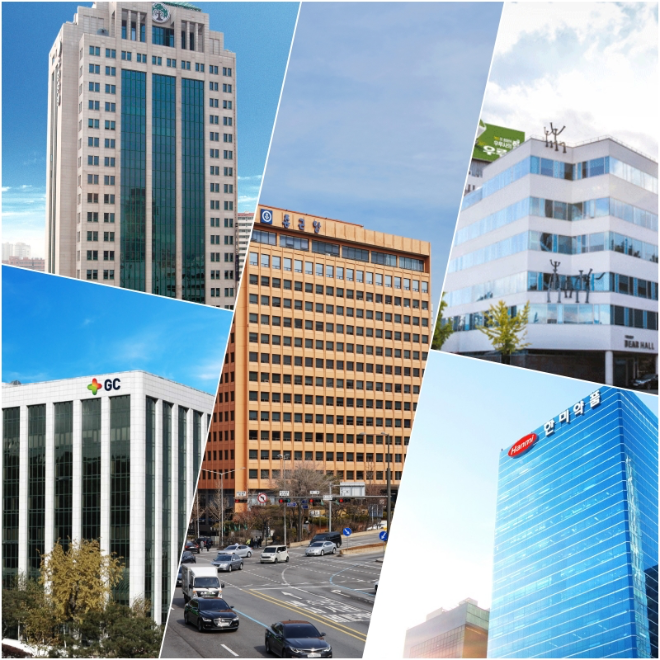 이미지 확대보기
이미지 확대보기According to our report on the 4th, traditional pharmaceutical companies such as Yuhan Corporation, GC Biopharma, Daewoong Pharmaceutical, and Chong Kun Dang have shown performance overseas and received favorable report cards (tentative) for the third quarter of this year.
This was largely due to lung cancer drug 'Leclaza'. The company received a $60 million (about KRW 804 million) milestone payment from Janssen Biotech in August after successfully securing U.S. Food and Drug Administration (FDA) approval for 'Leclaza'. The company had previously signed a $1.255 billion (KRW 1.6 trillion) deal in 2018 to transfer 'Leclaza' to Janssen. Even though the performance of its existing main business, prescription drugs, was sluggish, 'Leclaza'’s overseas earnings filled the gap.
GC Biopharma, which struggled in the first half of the year, also shed its deficit tag with the US launch of its blood product ‘Aliglo’. GC Biopharma’s sales (consolidated basis) in the third quarter of this year increased 5.8% year-on-year to KRW 464.9 billion. Operating profit for the same period increased 20.8% to KRW 39.6 billion.
GC Biopharma was unable to avoid deficits in the first half of the year due to the medical strike and the launch of Aliglo. However, it seems that it has entered a period of full-scale performance recovery as the sales of Aliglo, which received FDA approval in July and settled in the US, are reflected starting in the third quarter.
Daewoong Pharmaceutical’s sales and operating profit also jumped significantly. The company’s sales and operating profit (separate basis) in the third quarter increased 4.26% and 20.32% year-on-year to KRW 315.9 billion and KRW 41.1 billion, respectively.
The botulinum toxin product ‘Nabota’ and the gastroesophageal reflux treatment ‘Pexuclu’ played a leading role. Nabota is so popular that it is ranked second in the botulinum toxin market in the United States. The 34th domestic new drug, 'Pexuclu', was also launched simultaneously in three Central and South American countries, Mexico, Chile, and Ecuador, in August. At the time, Park Sung-soo, CEO of Daewoong Pharmaceutical, expressed a strong will to advance into the global market for Pexuclu, saying, “We will introduce it to 100 countries by 2027.”
What is notable is the growth of its affiliate Chong Kun Dang Bio. Chong Kun Dang Bio recorded sales of KRW 43.9 billion and operating profit of KRW 2.6 billion in the third quarter, successfully turning a profit compared to the same period last year. The company has been consistently in the black since the first quarter of this year, and this is due to the expansion of exports of raw pharmaceutical ingredients and finished products.
Hanmi Pharmaceutical is the only one among the top five pharmaceutical companies to see a decrease in both sales and operating profit compared to the same period last year. Consolidated sales for the third quarter of this year decreased by 0.7% year-on-year to KRW 362.1 billion. Operating profit fell 11.4% to KRW 51 billion.
In particular, the decline of Beijing Hanmi Pharmaceutical, a local Chinese corporation, is notable. Beijing Hanmi Pharmaceutical recorded sales of KRW 84.3 billion and operating profit of KRW 15 billion in the third quarter. These figures are 9.7% and 42.4% decreases, respectively, from the same period last year. ‘The number of business days decreased, and physical environmental factors such as natural disasters in China slowed down sales,’ said a Hanmi Pharmaceutical representative.
In addition, they added that they plan to rebound by targeting the global market. Hanmi Pharmaceutical emphasized, “We will present about 10 innovative new drug research results for cancer, obesity, and rare diseases at various global academic conferences in the second half of this year,” and “In particular, we plan to unveil a ‘new concept obesity treatment’ that simultaneously achieves weight loss and muscle gain for the first time at the American Society for the Study of Obesity in November.”
Meanwhile, according to the Korea Biotechnology Industry Organization, the global pharmaceutical market size as of last year was 1.61 trillion dollars (approximately KRW 2,150 trillion). In comparison, Korea’s market size was only 23 billion dollars (KRW 29.86 trillion). The U.S. accounted for more than 40% of the global market at 600 billion dollars (KRW 825.3 trillion).
A pharmaceutical and biotechnology industry official said, “The domestic pharmaceutical market is already saturated, and it is also very small compared to the U.S. in terms of size,” and “For continued growth, targeting global markets such as the U.S. is essential.”
Kim Nayoung, Korea Finacial Times (steaming@fntimes.com)
가장 핫한 경제 소식! 한국금융신문의 ‘추천뉴스’를 받아보세요~
데일리 금융경제뉴스 Copyright ⓒ 한국금융신문 & FNTIMES.com
저작권법에 의거 상업적 목적의 무단 전재, 복사, 배포 금지












![Samsung Electronics and SK Hynix Engage in High-Stakes AI Chip War [KFT Topic]](https://cfnimage.commutil.kr/phpwas/restmb_setimgmake.php?pp=006&w=284&h=214&m=5&simg=2026013013432407964141825007d12411124362.jpg&nmt=18)
![Hyundai Mobis Posts Record Results, Pivots to Robotics and Electrification [KFT Topic]](https://cfnimage.commutil.kr/phpwas/restmb_setimgmake.php?pp=006&w=284&h=214&m=5&simg=2026012911595100522141825007d12411124362.jpg&nmt=18)
![One Year In: CEO Hyun Shin-kyun Transforms LG CNS into KRW 6 Trillion AI Powerhouse [KFT Topic]](https://cfnimage.commutil.kr/phpwas/restmb_setimgmake.php?pp=006&w=284&h=214&m=5&simg=2026012807381208149141825007d12411124362.jpg&nmt=18)
!['Chung Eui-sun Declares Robot Management Era'... Hyundai Motor Group to Lead Robotics Age with 'Physical AI' [KFT Topic]](https://cfnimage.commutil.kr/phpwas/restmb_setimgmake.php?pp=006&w=284&h=214&m=5&simg=20260106111449071567492587736121125197123.jpg&nmt=18)
![Lee Jae-yong and Chey Tae-won, Korea's 'Semiconductor Duo,' Head to China... What's the Status of Local Operations? [KFT Topic]](https://cfnimage.commutil.kr/phpwas/restmb_setimgmake.php?pp=006&w=284&h=214&m=5&simg=2026010608232205705141825007d12411124362.jpg&nmt=18)
!['Beyond Mobile to Robotics': LG Innotek Continues Portfolio Expansion [KFT Topic]](https://cfnimage.commutil.kr/phpwas/restmb_setimgmake.php?pp=006&w=284&h=214&m=5&simg=2026010508201109906141825007d12411124362.jpg&nmt=18)
![Doosan Enerbility Eyes Return to 'A' Credit Rating After 9 Years on Nuclear Power and Gas Turbine Boom [KFT Topic]](https://cfnimage.commutil.kr/phpwas/restmb_setimgmake.php?pp=006&w=284&h=214&m=5&simg=2026010208511504157141825007d12411124362.jpg&nmt=18)
!["Samsung Is Back," Chip Chief Declares, Eyeing Record Profit on HBM Recovery [KFT Topic]](https://cfnimage.commutil.kr/phpwas/restmb_setimgmake.php?pp=006&w=110&h=79&m=5&simg=2026011408580109459141825007d12411124362.jpg&nmt=18)
![Koo Kwang-mo's Vision for AI and Robotics Drives LG Group's Transformation [KFT Topic]](https://cfnimage.commutil.kr/phpwas/restmb_setimgmake.php?pp=006&w=110&h=79&m=5&simg=2026012123034202714141825007d122461258.jpg&nmt=18)
!['Expansion' S-OIL vs. 'Caution' GS Caltex [KFT Topic]](https://cfnimage.commutil.kr/phpwas/restmb_setimgmake.php?pp=006&w=110&h=79&m=5&simg=2026012010260905723141825007d12411124362.jpg&nmt=18)
![One Year In: CEO Hyun Shin-kyun Transforms LG CNS into KRW 6 Trillion AI Powerhouse [KFT Topic]](https://cfnimage.commutil.kr/phpwas/restmb_setimgmake.php?pp=006&w=110&h=79&m=5&simg=2026012807381208149141825007d12411124362.jpg&nmt=18)
![Samsung's 'Last Chance': Lee Jae-yong Pushes HBM4 as Make-or-Break Moment [KFT Topic]](https://cfnimage.commutil.kr/phpwas/restmb_setimgmake.php?pp=006&w=110&h=79&m=5&simg=2026012623242806011141825007d122461258.jpg&nmt=18)